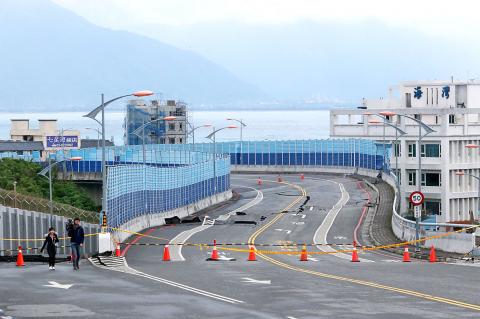The National Center for Research on Earthquake Engineering yesterday called for new laws to encourage the reconstruction of weaker structures, following the partial collapse of four buildings during Tuesday’s earthquake in Hualien.
The magnitude 6 earthquake, which occurred at 11:50pm on Tuesday, 18.3km northeast of Hualien County Hall, had an output level of 7 on the Modified Mercalli Intensity at its strongest point and caused damage to several structures, including two bridges and multiples buildings.
The Marshal Hotel suffered the most damage and was left leaning to one side after its bottom three floors crumpled.

Photo: CNA
At yesterday’s Lunar New Year-end news conference held by the Ministry of Science and Technology, center director-general Huang Shih-chien (黃世建) said the hotel, like structures that collapsed in previous earthquakes, was built before 1999 when stricter building code regulations were introduced.
This, combined with its proximity to the closest fault line, led to its collapse, Huang said.
Often these buildings have large open spaces in their ground floors, making them more prone to collapse, he said.
This is further exacerbated by the occupation of upper floors by residents, he said, adding that pillars or additional walls should be used to provide better structural support.
One of the issues stalling the reinforcement or reconstruction of older buildings is the large number of people who have property rights in the buildings.
Legal regulations governing the reconstruction process should be simplified, he added.
“If a consensus cannot be reached to move forward with reconstruction, I suggest property owners start with incremental, structural reinforcement,” he said, adding that owners of buildings with combined commercial and residential occupation be prohibited from making upper floors of their buildings publicly available until passing earthquake-resilience assessments.
Building Safety Certification Association director-general Tai Yun-fa (戴雲發) said reinforcements would not be enough and that older buildings must be reconstructed.
The Marshal Hotel had already undergone reinforcements, but was still unable to withstand a strong earthquake, he said, adding that the problem lay with its irregular facade and arcade-style architectural design.
Comparing the hotel with the collapse of the Weiguan Jinlong complex in Tainan during the earthquake on Feb. 6, 2016, Tai said that the latter differed in that its layout was not well designed.
The U-shaped design of that building, along with the use of poor-quality building materials, led to its collapse, he said.
Meanwhile, Huang said the center is capable of predicting an earthquake between five and 10 seconds in advance.
High-tech industry operators, including Taiwan Semiconductor Manufacturing Co and United Microelectronics Corp, should network their systems with the center to allow shutdown of equipment in the event of an earthquake, he said, adding this could prevent sensitive systems from damage.
The Taiwan High Speed Rail Corp is already networked with the center, he said.

‘DENIAL DEFENSE’: The US would increase its military presence with uncrewed ships, and submarines, while boosting defense in the Indo-Pacific, a Pete Hegseth memo said The US is reorienting its military strategy to focus primarily on deterring a potential Chinese invasion of Taiwan, a memo signed by US Secretary of Defense Pete Hegseth showed. The memo also called on Taiwan to increase its defense spending. The document, known as the “Interim National Defense Strategic Guidance,” was distributed this month and detailed the national defense plans of US President Donald Trump’s administration, an article in the Washington Post said on Saturday. It outlines how the US can prepare for a potential war with China and defend itself from threats in the “near abroad,” including Greenland and the Panama

A wild live dugong was found in Taiwan for the first time in 88 years, after it was accidentally caught by a fisher’s net on Tuesday in Yilan County’s Fenniaolin (粉鳥林). This is the first sighting of the species in Taiwan since 1937, having already been considered “extinct” in the country and considered as “vulnerable” by the International Union for Conservation of Nature. A fisher surnamed Chen (陳) went to Fenniaolin to collect the fish in his netting, but instead caught a 3m long, 500kg dugong. The fisher released the animal back into the wild, not realizing it was an endangered species at

The High Prosecutors’ Office yesterday withdrew an appeal against the acquittal of a former bank manager 22 years after his death, marking Taiwan’s first instance of prosecutors rendering posthumous justice to a wrongfully convicted defendant. Chu Ching-en (諸慶恩) — formerly a manager at the Taipei branch of BNP Paribas — was in 1999 accused by Weng Mao-chung (翁茂鍾), then-president of Chia Her Industrial Co, of forging a request for a fixed deposit of US$10 million by I-Hwa Industrial Co, a subsidiary of Chia Her, which was used as collateral. Chu was ruled not guilty in the first trial, but was found guilty

The Chinese Nationalist Party (KMT) is maintaining close ties with Beijing, the Democratic Progressive Party (DPP) said yesterday, hours after a new round of Chinese military drills in the Taiwan Strait began. Political parties in a democracy have a responsibility to be loyal to the nation and defend its sovereignty, DPP spokesman Justin Wu (吳崢) told a news conference in Taipei. His comments came hours after Beijing announced via Chinese state media that the Chinese People’s Liberation Army’s Eastern Theater Command was holding large-scale drills simulating a multi-pronged attack on Taiwan. Contrary to the KMT’s claims that it is staunchly anti-communist, KMT Deputy